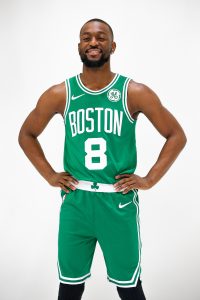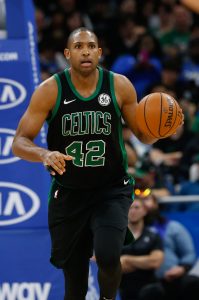Hoops Rumors is breaking down the 2019 offseason for all 30 NBA teams, revisiting the summer’s free agent signings, trades, draft picks, departures, and more. We’ll evaluate each team’s moves from the last several months and look ahead to what the 2019/20 season holds for all 30 franchises. Today, we’re focusing on the Boston Celtics.
Signings:
- Standard contracts:

- Kemba Walker: Four years, maximum salary ($140.79MM). Fourth-year player option. Signed using cap room.
- Daniel Theis: Two years, $10MM. Second year non-guaranteed. Re-signed using Early Bird rights.
- Enes Kanter: Two years, $9.77MM. Second-year player option. Signed using room exception.
- Vincent Poirier: Two years, $5.13MM. Signed using cap room.
- Javonte Green: Two years, minimum salary. First year partially guaranteed ($100K). Signed using minimum salary exception.
- Brad Wanamaker: One year, minimum salary. Re-signed using minimum salary exception.
- Two-way contracts:
- Non-guaranteed camp contracts:
- Tacko Fall: One year, minimum salary (Converted to two-way contract).
- Justin Bibbs: One year, minimum salary (Waived).
- John Bohannon: One year, minimum salary (Waived).
- Bryce Brown: One year, minimum salary (Waived).
- Kaiser Gates: One year, minimum salary (Waived).
- Yante Maten: One year, minimum salary (Waived).
- Dorian Pickens: One year, minimum salary (Waived).
Trades:
- Acquired the draft rights to Ty Jerome (No. 24 pick) and Carsen Edwards (No. 33 pick) from the Sixers in exchange for the draft rights to Matisse Thybulle (No. 20 pick).
- Acquired the Bucks’ 2020 first-round pick (top-7 protected) from the Suns in exchange for Aron Baynes and the draft rights to Ty Jerome (No. 24 pick).
- Acquired Kemba Walker (sign-and-trade) and either the Nets’ or Knicks’ 2020 second-round pick (whichever is less favorable) from the Hornets in exchange for Terry Rozier (sign-and-trade) and the Celtics’ 2020 second-round pick (top-53 protected).
Draft picks:
- 1-14: Romeo Langford — Signed to rookie contract.
- 1-22: Grant Williams — Signed to rookie contract.
- 2-33: Carsen Edwards — Signed to four-year, $6.46MM contract. Fourth-year team option. Signed using cap room.
- 2-51: Tremont Waters — Signed to two-way contract.
Contract extensions:
- Jaylen Brown: Four years, $103MM. Includes $12MM in incentives. Starts in 2020/21; runs through 2023/24.
Departing players:
- Aron Baynes
- P.J. Dozier (two-way)
- Jonathan Gibson
- Al Horford
- R.J. Hunter (two-way)
- Kyrie Irving
- Marcus Morris
- Terry Rozier
- Guerschon Yabusele (waived)
Other offseason news:
- Purchased their G League affiliate (Maine Red Claws).
- President of basketball operations Danny Ainge suffered mild heart attack.
- Hired Kara Lawson as assistant coach.
- Exercised 2020/21 rookie scale options on Jayson Tatum, Robert Williams.
Salary cap situation:
- Used cap space; now over the cap.
- Hard-capped.
- Carrying approximately $119.15MM in salary.
- No cap exceptions available.
Story of the summer:
When the offseason began, there was no doubt that changes were coming in Boston. A 49-win season and an appearance in the Eastern Conference Semifinals might have been considered a success for some franchises, but the Celtics were widely viewed as the favorites to win the East entering the 2018/19 campaign. Chemistry issues plagued the team all season, ultimately resulting in a disappointing second-round exit.
Fairly or not, Kyrie Irving bore the brunt of the criticism for the Celtics’ struggles. While he enjoyed one of the best seasons of his career on the stat sheet, his leadership was questioned and he didn’t look good in the team’s second-round series against Milwaukee. Throughout the spring, Danny Ainge and the Celtics’ front office were still paying lip service to the idea of retaining Irving in free agency, but there was little doubt the star point guard would end up elsewhere.
The more surprising development? Irving wasn’t the only All-Star to leave the Celtics this summer. Al Horford, who was considered likely to either pick up his player option or to opt out to negotiate a new deal with Boston, declined that option, then headed to the rival Sixers. Suddenly, the Celtics found themselves not just tweaking their roster but overhauling it.
Re-signing Irving and Horford and bringing back other key role players like Marcus Morris, Aron Baynes, and Terry Rozier would’ve pushed the Celtics well into luxury-tax territory. Instead, the team was able to open up enough room below the cap to add a new maximum-salary player, which created some intriguing opportunities. Ainge and company took full advantage of their changing circumstances by pursuing and landing another All-NBA guard: Kemba Walker.
Even with Walker on board, this Celtics roster isn’t as talented as last season’s. But after what happened last year, the club seemed to prioritize chemistry over talent to some extent this summer. Boston filled out its roster with high-character rookies in the draft, and then saw four of the club’s most important players – Walker, Jaylen Brown, Jayson Tatum, and Marcus Smart – get the opportunity to do some preseason bonding in China as part of Team USA in the 2019 World Cup.
Heading into the fall, this was certainly a much happier team than last year’s, even if its ceiling is lower.
Key offseason losses:
In Irving, Horford, Baynes, Rozier, and Morris, the Celtics lost a group of five players that could probably start for an Eastern Conference playoff team.
While Irving, who averaged a career-high 6.9 APG last season to go along with 23.8 PPG on strong shooting numbers, is the most talented player who departed Boston this offseason, the team at least managed to add another star player to replace him at the point. That wasn’t the case up front, where the Celtics will badly miss the stalwart defense provided by Horford and Baynes.
Though he wasn’t at his best in 2018/19, Horford is someone whose value has always exceeded his per-game averages. He’s one of the only NBA players who can hold his own against big men in the post while also matching up with a star like Giannis Antetokounmpo. And he knows exactly where to be on offense, with his ability to set screens and make shots opening up opportunities for teammates.
Baynes isn’t nearly the player that Horford is, but his size and toughness gave the Celtics options in the frontcourt against bigger lineups.
Rozier’s breakout performance in the 2018 postseason was a promising sign, but he struggled when he returned to the bench last season, making just 38.7% of his field goal attempts in the regular season and 32.2% in the playoffs. He wanted to be a starter, but based on last year’s showing, it would have been a major risk for Boston to pay him like one. The Hornets were willing to take that risk, which helped grease the wheels for a Walker sign-and-trade.
As for Morris, it was a tale of two seasons for him in 2018/19. In his first 38 games, he was one of the Celtics’ best players, averaging 15.6 PPG on .501/.452/.866 shooting. In the next 37, he recorded 12.3 PPG on a far less efficient .393/.297/.816 shooting line. Overall, he had a solid season, but the Celtics may not mind seeing Brown, Tatum, and Gordon Hayward getting many of the shot attempts that might have gone to Morris.
Guerschon Yabusele was the other notable loss for Boston this summer. The 16th overall pick in the 2016 draft, the French big man didn’t develop like the Celtics had hoped.
Key offseason additions:
In terms of pure talent, Walker is probably a downgrade from Irving, but there are reasons to believe he could be a better fit for this Celtics squad. With multiple talented play-makers in Boston’s lineup, the team doesn’t necessarily need its point guard to dominate the ball.
Walker was forced to do that in Charlotte because the Hornets didn’t have many other options, but he seems eager to share the burden on his new team. Last season, Walker finished the season with a usage rate of 31.5 compared to Irving’s 29.6. It seems like a safe bet that Kyrie is in line for a bump while Kemba’s number will fall — in the very early going this season, Walker’s usage rate is down to 26.6 while Irving’s is up to 37.9.
After using up their cap space, the Celtics used the room exception to sign Enes Kanter. Ideally, the C’s probably would’ve liked to acquire a player who could come close to matching Horford’s or Baynes’ defensive prowess. While Kanter won’t do that, he gives the team a non-perimeter scoring threat, which will be important. The move made sense, given Boston’s hole in the frontcourt and the team’s lack of spending power.
The other five new additions to the Celtics’ standard roster are rookies, and not all of them will be ready to contribute much right away. I don’t expect we’ll see Javonte Green or French import Vincent Poirier play major minutes, and Romeo Langford is still recovering from a knee injury.
That leaves Carsen Edwards and Grant Williams as the rookies most likely to have an impact. Edwards will be out there for his shooting, as his outburst of eight three-pointers in a single quarter during the preseason showed.
Williams, meanwhile, might not have played much for last year’s Boston squad, but there are minutes available in this frontcourt, and he has shown a maturity beyond his age (20) in the early going. He’s a high-IQ player who’s capable of keeping the rookie mistakes to a minimum.
Of course, we can’t move on from this section without mentioning Tacko Fall, who immediately became a fan favorite upon appearing in his first Summer League game in July. The 7’6″ center is on a two-way contract and is extremely raw, so we won’t see much of him as a rookie. Still, you can bet that Celtics fans will be rooting for blowouts when he’s on the active roster, so that he can earn some garbage-time minutes.
Outlook for 2019/20:
The Celtics probably don’t have the championship upside this season that we thought they did a year ago, but in many ways this roster looks more like the ones that Brad Stevens thrived with in his earlier years in Boston. Stevens has seemed more adept at getting the most out of limited rosters rather than managing a loaded one, so it will be interesting to see what he can do with this collection of talent.
Walker showed last season that he’s nearly capable of single-handedly carrying a team to the playoffs in the East, and he has a stronger supporting cast this time around. That makes Boston a safe bet for the postseason. If everything clicks, it won’t be at all surprising to see the team once again secure a top-four seed in the East.
Salary information from Basketball Insiders was used in the creation of this post. Photos courtesy of USA Today Sports Images.
Deepest team in the league right here. First game went into Philly lost by 14 with Kemba doing absolutely nothing at all. Philly is too top heavy and Milwaukee got worse than last year. Celtics for the eastern Conference
Cus Crise
Without Kaylee in the playoffs, Celts should make it to ECF against Bucks or Raps. Ms. October (aka Kaylee) will be watching from Jersey. He’ll be throwing bricks and blaming others elsewhere in 2021.
Unless the Bucks and Sixers both make it to the ECF.
Boston as usual is just an afterthought in the league! No way they make it to the ECF, impossible!
Kyrie, is much happier scoring 50 and losing then 18 and winning. The Nets are already witnessing his ball dominant, losing ways.